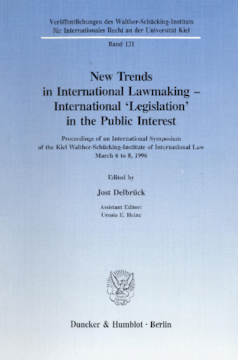New Trends in International Lawmaking - International 'Legislation' in the Public Interest

BOOK
Cite BOOK
Style
Format
New Trends in International Lawmaking - International 'Legislation' in the Public Interest
Proceedings of an International Symposium of the Kiel Walther-Schücking-Institute of International Law, March 6 to 8, 1996
Editors: Delbrück, Jost
Veröffentlichungen des Walther-Schücking-Instituts für Internationales Recht an der Universität Kiel, Vol. 121
(1997)
Additional Information
Book Details
Pricing
Abstract
New threat scenarios include global environmental hazards, poverty generated mass migrations, and international terrorism which in view of the still not satisfactorily solved problem of containing the proliferation of weapons of mass destruction has taken on a new dimension. Although undeniably the task of meeting these challenges is an instrinsically political one, there can be no serious doubt that respective political steps to cope with these global threats to the well-being of humankind cannot be effectively taken without an adequate and enforceable legal framework. It is quite evident that such international or global legal framework cannot be designed on the basis of a traditional sovereignity-oriented international law. One can observe that international law has begun to react to the new environment in which it is to function more effectively. Modifications of the modes of creating adequate legal norms and efforts to broaden the scope of relevant international legal norms as well as to strengthen their enforceability $avis-à-vis$z third states as in the case of the now well recognized norms with $aerga omnes$z effect are sure indications of the changing nature of international law in an era of global hazards. The 1996 International Law Symposium »The New Trends in International Lawmaking - International 'Legislation' in the Public Interest« brought together 28 leading scholars from the United States and Europe with a view to probe into these recent developments in the international legal order.
Table of Contents
| Section Title | Page | Action | Price |
|---|---|---|---|
| Foreword | 5 | ||
| Contents | 9 | ||
| Abbreviations | 10 | ||
| In memoriam Richard B. Lillich (1933–1996) | 13 | ||
| Jost Delbrück: Opening Address | 17 | ||
| Bernhard H. Oxman: The International Commons, the International Public Interest and New Modes of International Lawmaking | 21 | ||
| I. Public Interest Norms | 21 | ||
| II. International Legislation | 28 | ||
| III. Common Spaces | 30 | ||
| 1. Outer Space | 30 | ||
| 2. Antarctica | 31 | ||
| 3. The Sea | 31 | ||
| IV. Jurisdiction in Common Spaces | 33 | ||
| V. Enforcement Problems | 34 | ||
| 1. Piracy | 35 | ||
| 2. Shipboard Crimes | 36 | ||
| 3. Port State Enforcement of Environmental Norms | 37 | ||
| VI. Rules of the Road | 40 | ||
| VII. The ICAO Model | 43 | ||
| VIII. Antarctica | 46 | ||
| IX. Outer Space and the Electromagnetic Spectrum | 51 | ||
| X. The Oceans: Shrinking Common Spaces | 52 | ||
| 1. The Continental Shelf | 53 | ||
| 2. Fisheries | 54 | ||
| 3. The International Sea-Bed Authority | 58 | ||
| Conclusion | 60 | ||
| Eibe Riedel: International Environmental Law – A Law to Serve the Public Interest? – An Analysis of the Scope of the Binding Effect of Basic Principles (Public Interest Norms) | 61 | ||
| I. Introduction | 61 | ||
| II. Environment and International Law | 63 | ||
| III. The Stock of Existing International Environment Law | 67 | ||
| 1. Treaties | 67 | ||
| 2. Customary International Law | 70 | ||
| 3. General Principles of Law as Basic Principles of Common Interest | 76 | ||
| IV. Third Generation Rights and the Right to an Environment Worth Living in | 79 | ||
| V. The Rio Process | 82 | ||
| VI. Public interest norms of the world community | 89 | ||
| VII. Conclusion | 97 | ||
| Discussion | 99 | ||
| Klaus Dicke: National Interest vs. the Interest of the International Community – A Critical Review of Recent UN Security Council Practice | 145 | ||
| I. Introduction | 145 | ||
| II. What are "Threats to the peace"? The Practice of the Security Council under Art. 39 of the UN Charter | 147 | ||
| 1. General Findings and Cold War Practice | 147 | ||
| 2. Dynamic Interpretation of "Threats to the Peace" after 1990 | 150 | ||
| 3. International Statements on Art. 39 | 156 | ||
| III. Answers in Legal Doctrine | 159 | ||
| 1. Security Council Practice and the Sovereignty of States | 159 | ||
| 2. Humanitarian Intervention | 161 | ||
| 3. The Concept of Peace | 163 | ||
| 4. International Legislation | 164 | ||
| 5. The Council's Role in the Enforcement of Public Interest Norms | 165 | ||
| 6. Towards a Constitutionally Bound Legislation in the Interest of the International Community | 167 | ||
| IV. Conclusion: The Interest of the International Community – a New Source of International Law? | 168 | ||
| Jonathan I. Charney: International Lawmaking – Article 38 of the ICJ Statute Reconsidered | 171 | ||
| I. Introduction | 171 | ||
| II. The Contemporary International Lawmaking Processes | 177 | ||
| 1. Consent | 177 | ||
| 2. Categories of Public International Law | 180 | ||
| III. Contemporary Enforcement of International Law | 185 | ||
| IV. Conclusion | 189 | ||
| Discussion | 192 | ||
| List of Participants | 229 |
